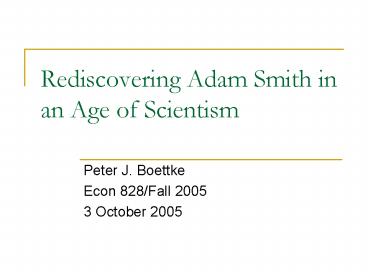Rediscovering Adam Smith in an Age of Scientism - PowerPoint PPT Presentation
1 / 8
Title:
Rediscovering Adam Smith in an Age of Scientism
Description:
Rediscovering Adam Smith in an Age of Scientism. Peter J. Boettke. Econ 828/Fall 2005 ... A modern restatement of the system of natural liberty ... – PowerPoint PPT presentation
Number of Views:74
Avg rating:3.0/5.0
Title: Rediscovering Adam Smith in an Age of Scientism
1
Rediscovering Adam Smith in an Age of Scientism
- Peter J. Boettke
- Econ 828/Fall 2005
- 3 October 2005
2
Main Points
- A modern restatement of the system of natural
liberty - Stability of possession transfer by consent
performance of promises. - Law as a Factor of Production
- Productivity of the System is a function of the
Rules - Hayeks The Abuse of Reason Project
- Beliefs are subjective knowledge is dispersed
- Judging Systems from the Bottom Up, Rather than
the Top Down - Counterfactual of what would be the consequences
if the competitive system were prevented from
operating - Epistemic Properties of a system
- Discovery of the unknown and unpredictable
3
Stability of Possession Transference by Consent
Performance of Promises
The rationale of securing to each individual a
known range within which he can decide on his
actions is to enable him to make the fullest use
of his knowledge, especially of his concrete and
often unique knowledge of the particular
circumstances of time and place. p. 156
158-159 29 160
4
Rule of Law as a Productive Factor of Production
Not only are the countries of the West richer
because they have more advanced technological
knowledge, but they have more advanced
technological knowledge because they are richer.
p. 47
How well the market will function depends on the
character of the particular rules. p. 229.
p. 153-54 155 62 25 32-33 146 206 223 228
5
The Abuse of Reason
What we have attempted is a defense of reason
against its abuse by those who do not understand
the conditions of its effective functioning and
continuous growth. p. 69.
69-70 59-61 54.
6
Judging the System from the Bottom Up, Not the
Top Down
It is because every individual knows so little,
and, in particular, because we rarely know which
of us knows best that we trust the independent
and competitive efforts of many to induce the
emergence of what we shall want when we see it.
p. 29.
30-31.
competition is valuable only because, and so
far as, its results are unpredictable we
do injustice to the achievement of the market if
we judge it, as it were, from above, by comparing
it with an ideal standard which have no known way
of achieving. Competition as a Discovery
Procedure (1969, 180 185)
7
Epistemic Properties
When we reflect on how much knowledge possessed
by other people is an essential condition for the
successful pursuit of our individual aims, the
magnitude of our ignorance of the circumstances
on which the results of our action depend appears
simply staggering. p. 24. 25-26
Prices direct attention to that which is in our
interest to find out.
8
Questions for Hayek
- Welfare economics of Robustness versus Paretian
Standard - What are the limits and potential of Federalism
as a mechanism for discovery of useful knowledge - What, if any, limits are there to public policy
while leaving scope for discovery





![Currency Technical Analysis by Adam Smith Associates Pvt. Ltd. [www.adamsmith.tv] PowerPoint PPT Presentation](https://s3.amazonaws.com/images.powershow.com/8859575.th0.jpg?_=20170621043)

























